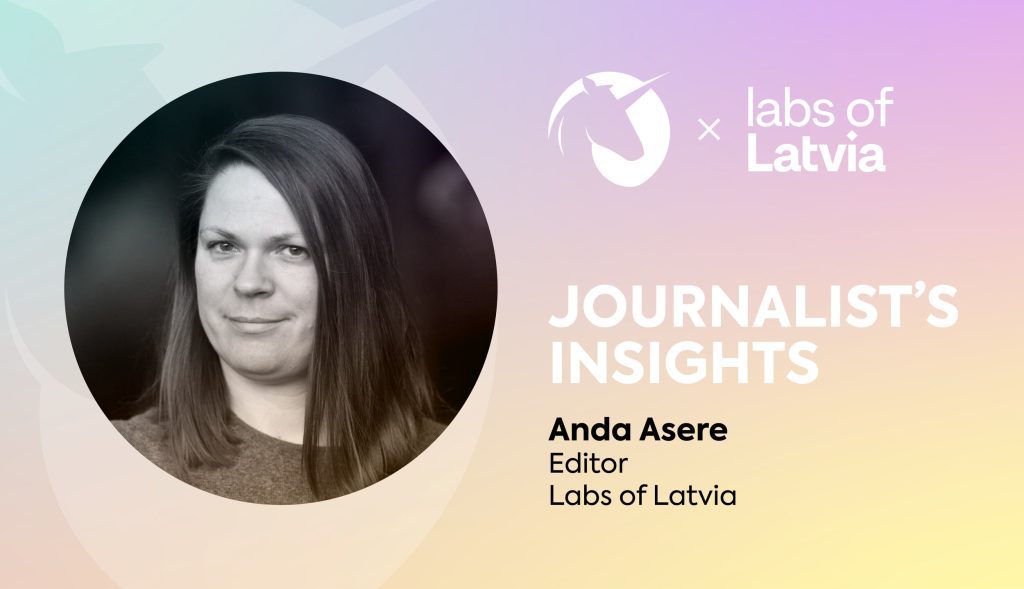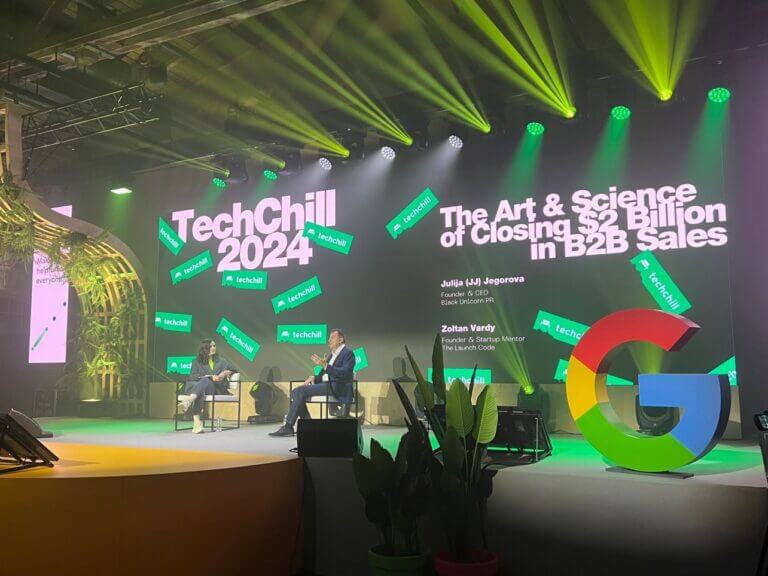In this blog post, we bring you a unique perspective on the Latvian startup ecosystem and the importance of local media.
We chatted with Anda Asere, a seasoned journalist hailing from Latvia, who work offers valuable insights into the rapidly evolving world of startups. Her coverage of this dynamic landscape brings to light the opportunities, challenges, and trends that define the growth of innovation in the Baltic region.
BUPR: Can you tell us about your journey in journalism and how you came to work at Labs of Latvia?
Anda Asere: I worked at the local newspaper Dienas Bizness for more than 10 years, covering small businesses. During the financial crisis in 2008, there was a new tendency – among new cafés, handmade jewellery and clothing brands some first interesting information technology companies arose. It was an interesting time; when the first mobile app and marketplace startups participated in accelerators and hackathons and started to call themselves startups, it was hard not only to understand what these new companies are doing but also to find the right terms in Latvian. I’m writing in Latvian and I had a very professional and strict editor who asked me to call things in normal words, not make a mix of English and Latvian.
So, fast forward, I started to write for Labs of Latvia in 2020. My friend Ieva Treija already worked there and she invited me to join the team. I agreed and I haven’t regretted it; I have the best boss you can imagine and a super cool and tiny team.
BUPR: How do you see the role of regional media such as Labs of Latvia in the startup ecosystem?
Anda Asere: On the one hand, Labs of Latvia appears in a specific position since it is financed by The Investment and Development Agency of Latvia. So, you can say it is a state channel telling the local and global community what is happening in the startups, science, innovations and technologies in Latvia and maybe it is not quite a ‘real media’.
On the other hand, nobody else in the commercial sector can afford to write so much for a specific niche. Of course, all the media will write about all Latvian startups becoming unicorns, raising big investment rounds. But nobody else will translate news from TechCrunch or Sifted about Latvian startups raising funds and sending out press releases only in English. Been there and done that. So I try to write as much as I can for as wide spectrum of startup-related news as I can.
Oh, the original question was about Labs of Latvia’s role in the startup ecosystem. From that angle, from the local perspective, Labs of Latvia works like a radar for other media, investors and people interested in entrepreneurship, innovations and science in Latvia to see what is happening, what’s new, and what crazy interesting ideas are out there. I’m beyond happy to see the articles about startups covered by Labs of Latvia later in other media as well. That means I have done a good job.
From a broader perspective, I believe it is very important that there is news in local media about local startups. It is super weird to see no information in local media about startups that are pitching global media. It always looks strange and the first question is: why nobody in the local community is writing about this startup? Is it even legit? Are they doing something bad? Why do they want worldwide recognition before telling their story in local media?
BUPR: What are some of the challenges and opportunities that local media faces in reporting on startups?
Anda Asere: OK, let’s start with the challenges. Everybody knows about all the big names, but I find it complicated to get information about very early-stage startups. Despite all being happy to read about well-known startups, it is especially important to talk about small and very early ideas as well. And it is hard to find very early-stage teams working on new ideas. My recipe is to follow my network and notice when somebody changes their position on LinkedIn.
Quite interesting, but sometimes it is challenging to get even to big startups. Especially after they raise some serious investment rounds, they go under the radar for a while, and usually there is not a lot of news in this phase between big round announcements.
Also, startups are very quiet when some bad things happen. It is unbelievably hard to get some comments in such cases, but silence is the worst strategy when things go bad.
Sometimes startups, both big and small, don’t want to talk to media. I get it, but I’m always very sad after all the no’s: ‘no, we are not interested in the local market, so we don’t have time for interviews’ – and eventually there are no answers to my emails at all.
So, let’s go back to opportunities. All the things I said have the other side too, i.e., right the opposite. In the local ecosystem, there are also very very very open and accessible people who answer 10 minutes after they have received my email, some of them chat on WhatsApp and they send me audio comments across the ocean from the USA. The local startup ecosystem is small, so it is super cool to get almost anyone, of course, if they want to speak.
BUPR: What role do you believe Labs of Latvia plays in the growth and success of local startups?
Anda Asere: I would like to think Labs of Latvia is their first media, interview and stage possibility. For me, interviews are an everyday routine but for a lot of them it is their first ever interview and I have quite a big pressure to show industry standards on how the interview is happening, how precisely I will translate their thoughts on paper and will anyone understand what they are doing. Sometimes they don’t like the result, even when I know I have done my best job ever. It asks you to be able to see yourself from a distance, and I understand it is hard to see that your quote doesn’t look so smart as in your head. But I will ask the startup founder what he or she has been doing for so long until I will get it clearly formulated and I will be able to communicate it to the audience. It is not only about how smart, sexy and buzzwordy your startup looks, it is about the audience understanding it correctly and getting why it is important to write about it at all.
BUPR: How important do you think it is for startups to build relationships with local media?
Anda Asere: I cannot emphasize enough how hugely important it is. As a journalist, I’m biased, but relationships with local media are absolutely important. For example, I write not only for Labs of Latvia but also for Latvian Forbes, Baltic Business Quarterly and from time to time for some other media as well. If you reject my interview which I offer as a Labs of Latvia journalist, there is a 99.9% chance that I will not offer you an interview for Forbes. And it is not some kind of punishment, no. Because you rejected the interview, I don’t know you and I can’t recommend you to Forbes editor to be covered in the next magazine.
Also, journalists are used to talk to each other, we even have some friends in the industry. Imagine, 15 years ago I worked in one place, now I work somewhere else, however, I still communicate with colleagues from my previous jobs. We are friends and we talk to each other. It is not uncommon to make a call and ask: ‘What do you think about startup X or founder Y?’ So we share this information. Sometimes I introduce foreign journalists to local startups, and I can give an honest recommendation when they are looking for something specific. Remember, we went for lunch, and you asked me what is happening in the Latvian startup scene and I gave you more than 10 interesting startup names. Thus, should I say once more that relationships with the media are important?
One more thing is that you can never know where a ‘small article’ will lead you. So please, never ever write on LinkedIn: ‘See what a nice small article is written about me!’ No, it is never a small article. It is huge! This is one step forward in your journey. And even if the article is not very complimentary to you or you don’t like the headline or whatever, it is your responsibility to share all the smallest articles about you and write additional comments (!!!) before sharing; you see, it is not always about what is said, but *how* it is said. You can manage all the communication crises (ok, almost all) with a good and smart communication.
BUPR: How do you choose which startups to feature in Labs of Latvia?
Anda Asere: I try to keep my eyes on everything that is happening in the industry and catch all the newcomers. To be honest, I see that I have been struggling with it since the pandemic. After a period of not attending meetups in real life, it is difficult to get to know all the new faces.
By the way, I’m not always covering startups that catch my eye right away. Sometimes I reach out to them and write an article about the startup immediately; sometimes I follow their journey for two years, and then it’s the right time for an interview. I can’t explain it very strictly; let’s call it a gut feeling.
BUPR: Can you share some of the most innovative startups you’ve reported on?
I don’t even know where to start! I can name you at least three cool startups in every vertical and stage. Let’s start with the ‘old’ ones. All should know Printful, Printify, Nordigen and Lokalise. If we are talking about hardware, very close to my heart is Beat the Storm which is making a storm simulator. The founder Ingus Augstkalns is one of the most inspiring persons in Latvia and I’m sure, even in the world. An interesting one is also Adventum Tech which develops hardware and software to mitigate structure collapses during construction. Through applying a variety of sensors they can monitor the structural integrity of load-bearing supports. Sounds good, right? One more from hardware – the high-precision laser weeding technology startup WeedBot.
Also, everyone should know iPhone Photography School, a local startup with excellent financial results and a worldwide footprint. The company just recently reported it has more than 410,000 paying customers worldwide and their turnover for the first quarter of this year was $4 million.
I’m following how Abillio is offering a company-as-a-service. I hope I will not need to eat my hat someday, but I see a bright future for them. Cellbox Labs is something mindblowing! They are working with organs on chips. Another one from the deep tech sector is Naco Technologies which aims to create specialized nano-coatings and new materials that replace the need for platinum and other expensive materials in the mass-scale production and usage of hydrogen.
It is very early, but finally, Latvia has a new startup generation coming into the ecosystem. They have worked for some time in the big startups and now are making their own, for example, Trace.Space with ex-Lokalise employees and Swotzy with former employees from Printful, Nordigen, and Longenesis. I love female-funded startups very much, so I can’t finish this list without Sapiens BI, SpirulinaNord, Alina.
These are not startups, but I will use the opportunity to mention also TechHub Riga, TechChill, Startin.LV, Riga TechGirls and Women4Cyber Latvia – all these organizations are led by women as well, and I’m super happy about all the hard work they have made in the last few years. Ok, I need to stop at some point, so let’s assume this is it. But I can tell you about Latvian startups for hours.
BUPR: How has the startup scene in Latvia evolved over the years and what role has local media played in this evolution?
Anda Asere: It’s something unbelievable what has happened, almost from nothing to the first unicorn and flourishing ecosystem. Of course, there are some challenges, etc. but overall, it is like magic. 10 years ago some people thought the startup was a new cafe or hairdresser salon. And all startups landed in one bag – fintech, platforms, marketplaces, etc. Now there are fintech, insurtech, regtech and many many more verticals.
I can’t express enough how much the industry has flourished during this time. You can compare TechChill five years from now and in 2023; it’s like a day and night. This year it was hard to get through the venue because of the big masses of people.
Sorry, I still have a pink glasses period with a Latvian startup ecosystem, so I can’t be very objective. I’m very biased and I can’t do anything about it!
BUPR: What advice would you give to startups looking to get their story covered in local media?
Anda Asere: Sure, people are consuming news much more differently than previously, but still, there are certain media outlets where a big part of startups want to be represented. First, you should read the media you want your startup to be covered in. At least your section, once per week, etc. This will help you to understand the topics which the media are covering. Why do you want to be exactly in this media outlet? Why do you think this is the right one for your startup story? Do you see how your story can get there? Are the media telling you about your competitors? What should you do to have your story there?
Of course, it is much easier to get in the media headlines with big investment numbers, but that is not all and only the journalists are writing about. You can always think of an angle where your story is naturally good for the media. And when the time comes, be ready for it.
Coming back to the original question, first, read what your target media is writing about. Second, be aware of journalists who are writing about topics related to you. Follow them on LinkedIn and Twitter. Start to communicate with them, make relationships. And make your move; tell about yourself.
However, before all of this, you should have a good story. I believe there is a story everywhere, you only need to polish it, find the right sauce or look at it from a different angle. If your startup is big enough, I would advise you to consider hiring a PR agency – they will help you.
BUPR: How can startups better engage with and leverage local media for their benefit?
Anda Asere: Just by being open and answering interview proposals. And even more – just by sending an email to a journalist and telling you are existing in this universe. You can’t imagine how rarely I get emails like this.
BUPR: How does Labs of Latvia balance the need to report on the success of startups while also covering their challenges and failures?
Anda Asere: To be honest, it is really difficult because nobody wants to talk about their failures. Emails about layoffs stay unanswered, nobody wants to deal with hard topics. Even if it is an awesome opportunity to communicate your news from your angle, at least in my mind.
But there is a small silver lining; when founders make a new startup, there is no way I will not ask about the previous one and the lessons learned. Sooner or later, there will be some interesting answers.
And it is not that journalists are looking for some bad news to show how terribly your startup is doing. No, your example is just one piece of a puzzle in the big picture, and maybe some startups can learn from your experience. I’m a believer that with a good story and nice quotes, you can get out of a bad situations like a king. Or queen. I guess, everybody has seen some Linkedin posts and articles in the media with a big number of shares where people are honestly telling about their bad experiences: a necessity to lay off a lot of people, a decision to shut down a project, etc. It is a matter of transparency and honesty, and people love it.
BUPR: What are your predictions for the future of the startup scene in Latvia and how will the role of local media evolve?
Anda Asere: First, talking about the startup scene, I’m totally sure it will continue to develop. There are employees with stock options from big startups who are making their projects, they are investing in the ecosystem, and new ideas are born. All is fine in that area. Even though the world is in crisis, it always brings something new to the market: new people, new ideas, new startups.
Second, talking about the role of the local media, I’m sure the media will write more and more about local startups. The topic is hot, startups are interesting, even if mainstream media gets more and more interested in this highly innovative and interesting sector and even if sometimes startupers talk in their own language which is hard to understand with all these buzzwords around.
BUPR: How do you see the intersection of journalism and public relations in the context of startups?
Anda Asere: Actually, there is a very small number of startups that have inhouse PR people. Moreover, in most cases, they are working with PR agencies only when investment rounds need to be communicated, and sometimes investors choose their PR agencies far from Latvia, so in the best-case scenario we got some press releases in English.
I am aware that startups have limited resources for communication in the first years, but it doesn’t mean funders can forget about it. The sooner you make a good or, let’s say, at least professional relationship with the media, the sooner your brand gets recognition, visibility and voice. We are used to talk about the phenomenon when similar ideas being born at once, so imagine the situation where two similar ideas appear in the market, and only one of their creators is communicating with the media. What happens next? I don’t want to declare that one of them will not get investments, ect., because of neglecting public relations, but visibility is a serious piece of a big puzzle. And you can’t measure it from a short-term perspective, this is a longtime game.
BUPR: Do you think there’s a risk of local media being overshadowed by global media giants in covering local startups?
Anda Asere: Heh, did I sound so sad? It is hard to tell. I understand the wish to be covered on Tech.eu, TechCrunch and Sifted. I totally get it. I would like to read there a super nice article about me as well 😀
Global media are extremely selective, they need big numbers and big news. Can your startup offer those to them? How often will big media outlets write about you? I’m sure local media will write about you more often and maybe from a much warmer perspective. So, I would like to think you need both local and global media.
BUPR: What are your main pet peeves when founders get in touch with you?
Anda Asere: Oh, where to start? First, it is super annoying when startups send out a press release about investment and do not tell how much or from which investor it is. No numbers, no publication – so simple. And remember, ‘six-digit investment’ tells nothing about your investment, it can be anything from 100k to 999k. I really don’t get why somebody needs to be so secretive about the numbers. Oh, even more, I can’t tolerate exit news without numbers.
When there is silence, there are always a bunch of questions: why do you even want to tell about the exit or investment fact if you are not telling numbers? Was the money so small you are not feeling proud to name it?
This is the reason why I like public companies; they have obligations to tell numbers.
Transparency is very welcomed in the industry. When all are competing with broader and bolder headlines, numbers help to stay in some kind of understandable playground.
What else? Photos is a big topic. Please, take good photos in a landscape format. Don’t send photos to a journalist and later ask to change a photo (the same photo you sent) to another one. Please, do not! Don’t keep in your press kit photos with team members who are not working with you anymore, especially founder’s photos where there are three or five people.
I have problems with emails as well, but sometimes there are situations when I get an email with an introduction to a company offering to write about it, and there is never an answer to the questions I send back later.
One more thing – please, don’t send press releases in pdf format or on WhatsApp.
BUPR: How many pitches do you get per day?
Anda Asere: Honestly, very few.
BUPR: What stories are you looking for (from both local and international entrepreneurs)?
Anda Asere: First, the big success stories, and they can be ‘big’ in several aspects: big numbers (turnover, profit, investment, downloads, clients, etc.) as well as a big impact.
Second, I always like a fresh perspective; this is so much more interesting to write about someone who is first in a niche. It is harder to find a fresh angle when somebody is already the tenth on the investment platform. Why should readers care about one more app when there are already plenty of them?
Third, they are interesting stories. I know it does not sound especially specific, but that’s the beauty of it. I believe there is something interesting in every story, you just need to find it.
BUPR: How would you describe your relationship with PR professionals?
Anda Asere: Maybe even too good 😀 I have been in the industry for a long time, so it is only natural to have quite good relationship with PR professionals, because in some way we are partners. They often give me very valuable information, not only press releases and offerings to interview somebody. They also know very well what happens in the industry, who has a tough time and who is not the best player in the ecosystem. So it is not unusual for me to go for a coffee or lunch with someone in the industry and not talk about their company or client at all. We have a good time, I know how their children and dogs are doing and even about their loss of a mother or father.
Of course, it is not possible to have such a close relationship with everyone, but I try to keep at least warm relationships with everyone in the industry. This is an especially close community, so there is no reason to make enemies.
Have you seen the rest of our blog yet? Here is more from our Journalist’s Insights series:
Connecting the European startup scene with Patricia Allen of EU-Startups
Breaking the Journalism Mould with Dan Taylor from tech.eu
Busting Journalism Myths with Lindsay Dodgson from Business Insider
Diving into fintech journalism with Doug Mackenzie from Fintech Finance
Securing media placements during COVID-19 with Yessi Bello-Perez from The Next Web



